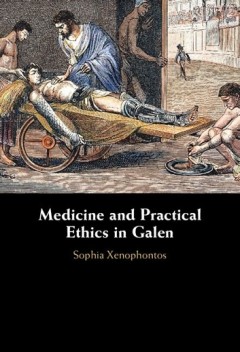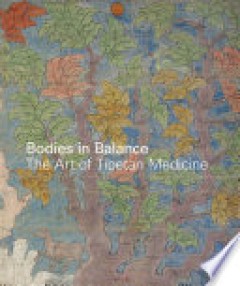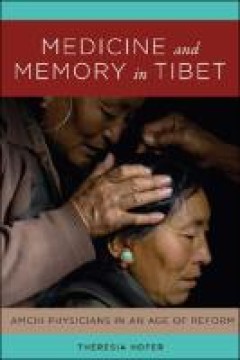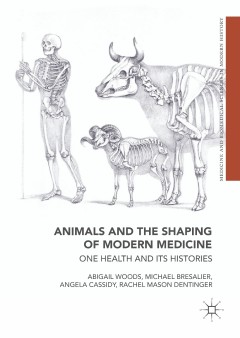Filter by

Medicine and practical ethics in Galen
Offering the first authoritative analysis of Galen's psychological and ethical works alongside a large number of technical tracts, both medical and philosophical, this book provides a new framework through which we can comprehend Galen's role as a practical ethicist - an aspect of his intellectual profile that has been little understood until now
- Edition
- -
- ISBN/ISSN
- 9781009247795
- Collation
- xv, 300 pages
- Series Title
- -
- Call Number
- 610.938 XEN m

Bodies in Balance : The Art of Tibetan Medicine
2015 Best Art Book Accolade, ICAS Book Prize in the Humanities Category Bodies in Balance: The Art of Tibetan Medicine is the first comprehensive, interdisciplinary exploration of the triangular relationship among the Tibetan art and science of healing (Sowa Rigpa), Buddhism, and arts and crafts. This book is dedicated to the history, theory, and practice of Tibetan medicine, a unique and compl…
- Edition
- -
- ISBN/ISSN
- 9780295807089
- Collation
- 360p.
- Series Title
- -
- Call Number
- 615.85156 THE b

The handbook of salutogenesis
This in-depth survey of salutogenesis shows the breadth and strengths of this innovative perspective on health promotion, health care, and wellness. Background and historical chapters trace the development of the salutogenic model of health, and flesh out the central concepts, most notably generalized resistance resources and the sense of coherence, that differentiate it from pathogenesis. From…
- Edition
- -
- ISBN/ISSN
- 9783319046006
- Collation
- -
- Series Title
- -
- Call Number
- 616.0019 mit

Medicine and memory in Tibet : amchi physicians in the age of reform
Only fifty years ago, Tibetan medicine, now seen in China as a vibrant aspect of Tibetan culture, was considered a feudal vestige to be eliminated through government-led social transformation. Medicine and Memory in Tibet examines medical revivalism on the geographic and sociopolitical margins both of China and of Tibet’s medical establishment in Lhasa, exploring the work of medical practitio…
- Edition
- -
- ISBN/ISSN
- 9780295743004
- Collation
- xvi ; 286p. : ill.
- Series Title
- -
- Call Number
- 610.9515 THE m

The Cambridge Handbook of Health Research Regulation
The first ever interdisciplinary handbook in the field, this vital resource offers wide-ranging analysis of health research regulation. The chapters confront gaps between documented law and research in practice, and draw on legal, ethical and social theories about what counts as robust research regulation to make recommendations for future directions. The Handbook provides an account and analys…
- Edition
- -
- ISBN/ISSN
- 9781108620024
- Collation
- xix, 444 p ; ill
- Series Title
- -
- Call Number
- 344.04196 CAM G

Anti-vivisection and the profession of medicine in Britain : a social history
This book explores the social history of the anti-vivisection movement in Britain from its nineteenth-century beginnings until the 1960s. It discusses the ethical principles that inspired the movement and the socio-political background that explains its rise and fall. Opposition to vivisection began when medical practitioners complained it was contrary to the compassionate ethos of their profes…
- Edition
- -
- ISBN/ISSN
- 9781137556974
- Collation
- xxi, 217p. : ill.
- Series Title
- -
- Call Number
- 179.4 BAT a

Animals and the shaping of modern medicine : one health and its histories
This book breaks new ground by situating animals and their diseases at the very heart of modern medicine. In demonstrating their historical significance as subjects and shapers of medicine, it offers important insights into past animal lives, and reveals that what we think of as ‘human’ medicine was in fact deeply zoological. Each chapter analyses an important episode in which animals ch…
- Edition
- -
- ISBN/ISSN
- 9783319643373
- Collation
- xvii, 280p. : ill.
- Series Title
- -
- Call Number
- 509 ANI a
 Computer Science, Information & General Works
Computer Science, Information & General Works  Philosophy & Psychology
Philosophy & Psychology  Religion
Religion  Social Sciences
Social Sciences  Language
Language  Pure Science
Pure Science  Applied Sciences
Applied Sciences  Art & Recreation
Art & Recreation  Literature
Literature  History & Geography
History & Geography